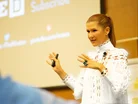Q&A: Professor Loredana Padurean, Asia School of Business

As someone who is creating Asia Pacific’s business leaders of the future, what do you believe are the essential skills leaders require?
In many ways, we need leaders who are Renaissance women/men or polymaths, as opposed to specialists of an industry or a field. A polymath is a person with profound knowledge, proficiency and expertise in multiple fields and today’s leaders have to be able to combine various ideas, look at problems in novel and useful ways, and develop a broad and yet still deep set of skills, talents, and knowledge.
You’ve coined ‘smart’ and ‘sharp’ as skills of the future. What are these?
They are replacements for ‘soft’ and ‘hard’ skills, a concept coined by a US Army doctor in 1972 who observed that his pupils had different skills: dealing with machinery required ‘hard’ skills, while dealing with people and paper were ‘soft’ skills. This concept has served us well since, but I find it too binary, not to mention the semantic implications of the words themselves.
Soft implies gentle, delicate, mild, quiet, tender, weak. However, there is nothing soft in navigating competing perspectives and cultures, handling and delivering critical feedback or dealing with office politics. Instead, I prefer to call these skills ‘smart’. Hard implies rigid, difficult, heavy, static. But how can we think of engineering or software development as static or rigid? I believe ‘sharp’ is more apt as such skills need constant updating or sharpening.
I think it’s time to reflect on these classifications, because we can drastically change someone’s perspective by how we choose to talk about and frame something.
How important are smart skills in leadership today?
Smart skills are more important than ever because we live in a world of extreme diversity: generational, ethical, value-based, gender, etc. Gone are the days when giving an order was an effective act of leadership. I personally work with people from five different continents and across five different generations, therefore as leaders, we need to know how to adapt, motivate, inspire and connect. We need to increase our investment in learning about them in action, especially as smart skills are more difficult to develop.
I believe that a successful leader today has to be both smart and sharp. Take cognitive readiness, one of my top 10 smart skills. In order to be cognitive ready, one has to master system dynamics, one of my top 10 sharp skills. Also, did you know that one of the primary reasons why digital transformation fails is not the absence of digital literacy, a sharp skill, but the need for more validation and adaptability, both smart skills. So, instead of thinking of these skills as binary, I prefer to think of them as the yin and yang; co-existing and complementing each other.
So, you can teach leaders smart skills then?
Yes, you can, via a combination of the classroom experience, plus an action component supported by deeply embedded reflection. At ASB we call this Action Learning, and we teach it both in the MBA and in the executive programs. For example, in teaching a leader emotional maturity as a smart skill, first they need to learn what it is, and then act on it, before reflecting on what we did and how we did it. And then to repeat it, but this time with more expertise and awareness. It’s not easy, but that’s why my favourite mantra is ‘the job is easy, the people are not’.
Discover Professor Padurean's successful skills for a digital transformation here
- How incoming CEO Mohit Joshi is restructuring Tech MahindraCorporate Finance
- Why Kotak Mahindra Bank has appointed an outsider as CEOLeadership & Strategy
- These are the 10 most high-profile CEO moves across AsiaLeadership & Strategy
- Ping An, Macquarie CEOs among world’s 10 most powerful womenLeadership & Strategy



